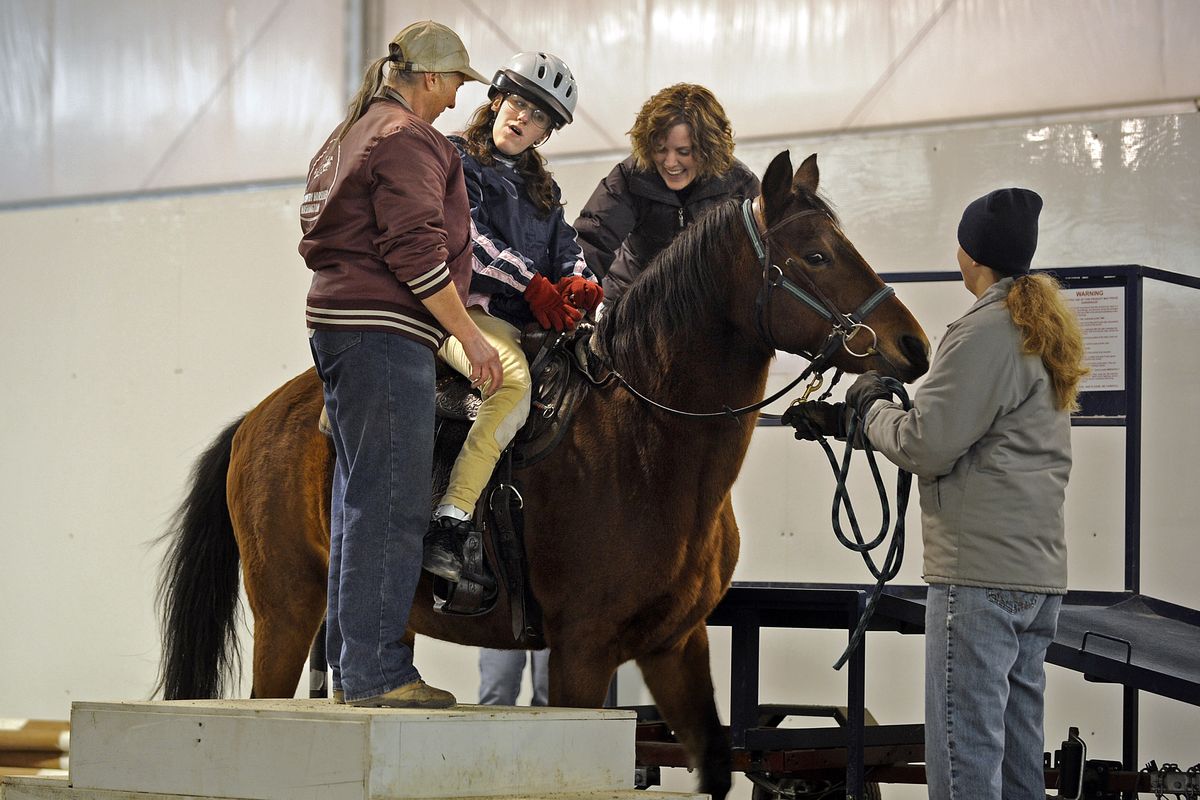The horsepower of healing
Spokane ranch is home to equine therapy program

It’s a chilly Friday morning, and the forecasters are talking about snow. Inside the big, bright riding arena at Westar Ranch just south of Spokane, a couple of horses are being warmed up.
Waiting riders stay bundled for warmth, hands deep in pockets, chatting until they can climb aboard the horses. Among the riders is Kendyl Caro, a 19-year-old East Valley High School senior who has cerebral palsy, but that’s not going to keep her from riding.
At Free Rein Therapeutic Riding, everyone has a chance to get on a horse, no matter what disability may challenge them. The program has slowly come together over the last couple of years, and it’s been around in its current form for a little more than one year.
“I love horses,” said Caro, who’s been coming to Free Rein for more than two years. Caro brought her grandmother Bonnie Caro, who said the horseback riding sessions have made a huge difference for Kendyl.
“She walks with her knees sort of together,” said Bonnie Caro. “But riding the horses, it helps to stretch the inside of her legs, and I think the width of the horse helps her legs, too.”
Free Rein gives 27 riders with various disabilities the opportunity to come and ride. Dozens and dozens of volunteers help them out.
“We typically have one person leading the horse, and one or two people working alongside the rider,” said Sandy Jones, who’s a registered instructor in therapeutic riding and the director of Free Rein. “We do our best to keep the teams together so the same people work with the same rider, but we are not always successful.”
Riders sign up for eight-week sessions, taking one $27 lesson a week. Therapeutic riding can’t replace physical therapy, but it’s widely recognized that it helps riders gain better muscle control, balance and core strength, said Jones.
“And it adds mobility. When you get the hang of it, you may be able to go on a trail ride,” Jones said.
Kendyl Caro gets so excited before her weekly ride on Mandy that she can barely wait for the horse to get brushed and saddled.
In the arena, Mandy sidles up to a big, sturdy ramp that lets Caro walk up next to the horse at stirrup level. Wheelchair users can roll up the ramp, too, giving them much easier access to the horse.
“Rotary 21 donated the ramp,” Jones said. “It’s a very solid ramp and it’s movable – we can put it wherever we need it.”
Once aboard Mandy, Caro held the reins loosely and said “walk on.”
And off she went – at first a bit wobbly, but soon sitting up straight with great control over her upper body.
“It’s given her so much better control of her head and torso,” Jones said. “She rarely bends over or anything.”
Caro’s favorite part of the riding lesson is when she gets to trot.
Her laughter can be heard in the entire arena as Mandy carefully carries her from one end to the other.
Jones said the therapy horses of course have to be unflappable and gentle, but they also have to have soft gaits that make them easy to sit on.
“It’s a care lease program, so we take them in for 30 days to see if they can do it,” Jones said. “There are so many things that need to work out. The tack we have has to fit, and we have to match them with the right rider.”
Though this kind of horseback riding, which is mostly at a walk or a slow trot, seems low-impact compared to show jumping or barrel racing, it’s hard work for the horses.
“They have to tolerate a lot of strange movement on their backs and be very careful what they do,” Jones said.
There are 10 riders on the always growing waiting list, with winter session starting in the middle of February.
Jones – who worked for the Little Bit Therapeutic Riding program in Woodinville, Wash., before moving to Spokane – said she’s really happy with the progress the program has made.
“We have some very committed sponsors and donors who are making this possible,” Jones said. Over the past years, she added, she’s watched other programs carefully to try and find what makes them successful.
Like many other nonprofits, Free Rein has to watch its finances carefully.
“But hey, I’m kinda frugal,” said Jones, laughing, “so that’s not so hard. We are just so happy we can do this.”
Free Rein is a registered nonprofit organization with a board and a business plan.
“It seems like everything finally fell into place,” Jones said. “Our goal is to one day have a scholarship program so everyone can get to ride no matter their financial circumstances.”